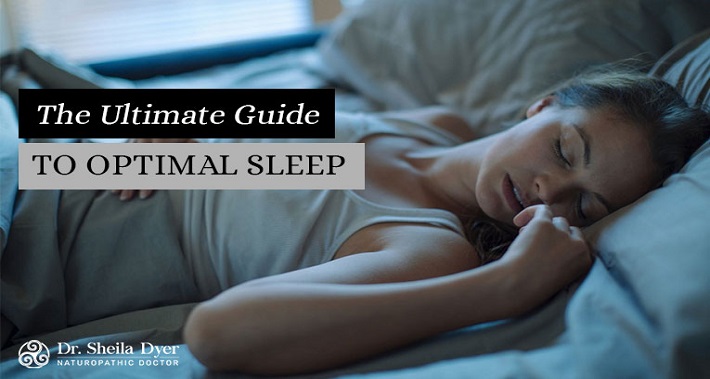It’s no exaggeration to say that good sleep quality is one of the most important things you can strive for, every day.
Restful and consistent sleep is necessary for your body and brain to function properly.
If you’ve ever experienced poor sleep quality, I’m sure this is something you can attest to.
As a naturopathic doctor in Toronto, I see this issue a lot in my clients.
Hey, I get it.
When you live in a fast paced, major city, consistently getting enough sleep can seem impossible.
You hardly have enough time to finish all your daily tasks, let alone sleep.
Nonetheless, your overall health relies on a healthy sleep schedule.
In this guide to optimal sleep, we’ll discuss the specific ways sleep affects your body, the health impacts of poor sleep, and some easy steps you can take from home to make sure you’re well rested throughout the day.
Why Is Sleep So Important?
If you’ve ever had a restless night, you know how terrible sleep deprivation makes you feel.
This is because sleep is necessary for numerous brain functions, including productivity, overall cognition, and concentration.
Your mood, energy levels, and memory can all be greatly affected by your quality (and quantity) of sleep.
What Is Sleep Hygiene?
You may have heard the term “sleep hygiene” before, but what exactly does that mean?
Just like other aspects of your life, maintaining healthy sleep is crucial and requires some good habits and routine.
Daytime fatigue, frequent sleep disturbances, and taking a long time to fall asleep are common signs of lacking sleep hygiene.
RELATED: Can Acupuncture Help With Chronic Fatigue?
To practice good sleep hygiene, make sure you’re getting the recommended 7 to 9 hours of sleep a night.
We’ll get into specific habits you should incorporate into your routine to encourage great sleep, but first, let’s look at how poor sleep impacts your health.
Health Impacts Of Poor Sleep
Poor sleep quality can not only affect your brain function, but also many other aspects of your life and health.
RELATED: Does Your Insomnia Have A Medical Cause?
Let’s look at some of the symptoms and conditions you may be experiencing as a result of bad sleep hygiene.
1. Weight Gain
Sleep is a large contributing factor when it comes to neuroendocrine function and glucose metabolism.
This means your sleep influences your hormone levels.
The relationship between chronic sleep loss and weight gain has been studied for many years, and this 2010 study found that sleep restriction has drastic effects on your hormones.
This stress on your endocrine system may be the reason why sleep is important for you to maintain a consistent and healthy weight.
RELATED: What Are Endocrine Disruptors And How To Avoid Them?
People with short sleep duration, whether you don’t sleep very long or you wake up frequently throughout the night, tend to gain more weight over time than normal duration sleepers.
Additionally, your appetite and hunger levels are affected by not getting enough sleep.
2. Heart Disease
Proper sleep also plays a major role in heart disease.
Getting enough sleep helps regulate your blood pressure, which is great news for your heart health.
Epidemiologic evidence shows an association between both too much and too little sleep, and cardiovascular diseases.
Getting adequate and restful sleep can also help you avoid sleep apnea, which affects how much oxygen you get while you sleep.
This is a potential risk factor for numerous health issues, including stroke and heart attack.
3. Type 2 Diabetes
As mentioned above, sleep has a massive effect on your endocrine system and glucose regulation.
It can even play a role in the development of type 2 diabetes.
Sleep restriction has shown to increase your risk of developing diabetes, even in healthy and young individuals.
4. Decreased Cognitive Function
The one symptom most commonly associated with sleep deprivation and poor sleep quality is decreased cognitive function.
If you aren’t sleeping well, or sleeping enough, your focus and cognitive control will be much worse than normal.
According to 2010 research by Deak and Stickgold, sleep is essential for your learning, memory, and cognitive processing.
And that’s not all.
Poor sleep quality can even significantly impair your risk judgment.
In fact, lack of quality sleep can actually make you more likely to take unnecessary risks, especially in youth.
5. Increased Risk Of Accidents
Because of how sleep affects your cognitive control, it can be risky to sacrifice your sleep quality.
Focus and concentration are very important when it comes to everyday tasks, especially driving.
Short sleep duration and sleep apnea can make you feel fatigued during the day, which is a known cause of car accidents.
It’s unsafe for you and others to be on the road, or operating any other type of heavy equipment, without having a good night’s rest.
On top of that, some significant disasters in recent history caused by human error have been linked with sleep deprivation.
These include:
- The nuclear meltdowns at both Chernobyl and Three Mile Island
- The explosions of both the Challenger and Columbia Space Shuttles
- The Exxon Valdez oil spill
- The chemical plant disaster at Bhopal, India
- And many more
How To Improve Your Sleep Hygiene
There are many simple and natural steps you can take to improve your sleep hygiene.
It’s worth the effort, and you will feel the benefits from incorporating even a few of these habits into your routine.
1. Make Your Bedroom Perfect For Sleeping
The environment around you can have a big impact on your sleep quality.
Are your mattress and pillows comfortable, or do you find yourself waking up in the middle of the night with discomfort or pain?
The temperature of your room is another factor to consider.
Between 15 and 20 degrees Celsius, or 60 and 67 degrees Fahrenheit, is the recommend temperature for optimal sleep.
Keeping your bedroom clean and decluttered is also important.
Having a neat room has a calming effect.
According to a 2012 article by Psychology Today, mess and clutter can majorly affect your stress levels.
And when you’re stressed, your sleep is bound to suffer.
Therefore, make sure that your sleeping area is clean and clutter free before you try and catch some zzzs.
2. Turn Off Your Screens Before Bed
Bright light, especially the blue light emitted from device screens, can be very disruptive to your natural sleep patterns.
Most smart phones have a function that both dims and warms the tone of your phone’s light throughout the day, which may help your eyes wind down into the late afternoon.
However, it’s best to set your tech aside at least an hour or two before sleeping.
This device break can also help your mind destress and prepare your brain for bed.
3. Try Natural Sleep Aids
Nowadays, there are quite a few all natural sleep aids with few side effects that may fit your lifestyle.
If you find that the other suggestions on this list, are just not helping, it may be nice to add in a supplement or herb.
RELATED: Herbs That Offer Support In Times Of Stress
Melatonin is a hormone your body produces that plays an important role in your sleep wake cycle.
RELATED: Health Benefits Of Melatonin: Beyond Sleep
Your natural levels of melatonin rise in the evening, and taking melatonin as a supplement is rising in popularity due to its effectiveness in improving sleep quality and helping with sleep disorders.
Valerian root is another natural supplement often used to improve sleep quality.
In fact, it’s one of the most popular sleep promoting herbs in the US and Europe.
You can find valerian root in capsules or as a tea, and it is also used as a natural treatment for symptoms of depression, anxiety, and menopause.
RELATED: Thrive Through Menopause With These 5 Diet Tips
Other herbs and natural supplements known to boost your sleep quality include magnesium, lavender, and passion flower.
As always, consult with your naturopathic doctor before adding a supplement to your daily routine.
4. Maintain Your Circadian Rhythm
Your circadian system keeps your body in sync with the 24 hour day, which is why it’s also known as your body’s internal clock.
It sends signals throughout your body and affects your endocrine system, digestive system, and many other crucial functions.
RELATED: Naturopathic Doctor For Hormones
Feeling awake and energized in the morning and adequately tired before bed are signs that your circadian rhythm is balanced.
To maintain your circadian rhythm, expose yourself to natural signals such as daylight in the morning and complete darkness at night.
This can be as simple as dimming the lights at night while preparing for bed and adding more bright lights in the morning.
Of course, this is easier said than done for shift workers, but we’ll talk more about that in next week’s article.
RELATED: Why Shift Workers Should Not Eat At Night
5. Destress In The Evening
The last step in your sleep routine is often the most enjoyable one – destressing after a long day and preparing for bed.
Your bedtime routine should be unique to you and what you find relaxing.
This may include reading a book, stretching, or taking a warm shower or bath.
Easing your mind and preparing for sleep is the best way to start off your night and ensure you will sleep well.
Book Your Appointment With Dr. Sheila Dyer, ND, Today
Sleep disorders and poor sleep quality can truly wreak havoc on your quality of life, but there are natural solutions to help you achieve excellent sleep hygiene.
If you want to learn more about how you can have a restful sleep every night, contact me, Dr. Sheila Dyer, ND.
I will work with you to formulate the perfect sleep plan for you and your lifestyle.
Whether you’re suffering from insomnia, restless sleep, frequent waking, or daytime fatigue, I can help.
Book your appointment with me, Dr. Sheila Dyer, ND, today to have a more restful sleep.
If you have questions about naturopathic medicine, or would like to start with your first consultation, contact me, and let’s book an appointment.
Dr. Sheila Dyer, ND1080 Dovercourt Rd,
Toronto, ON M6H 2X8
(416) 554-5135
► https://g.page/DrSheilaDyerNd
Dr. Sheila Dyer is a Naturopathic Doctor and a practicing registered nurse offering holistic healthcare with a scientific focus

